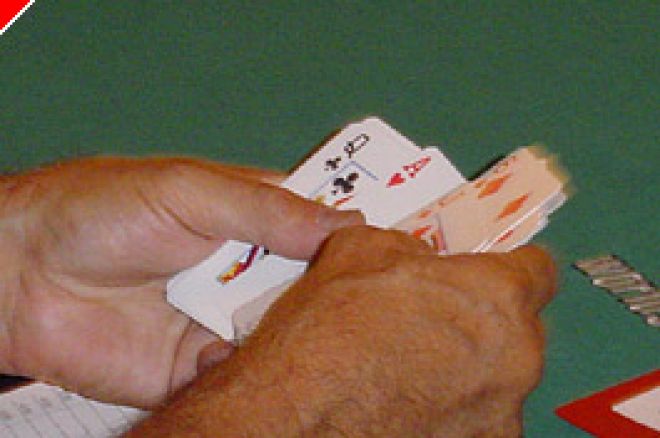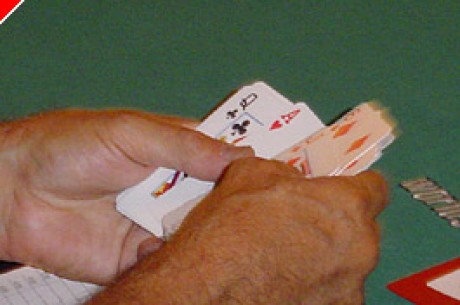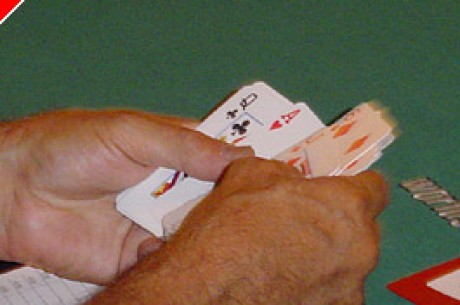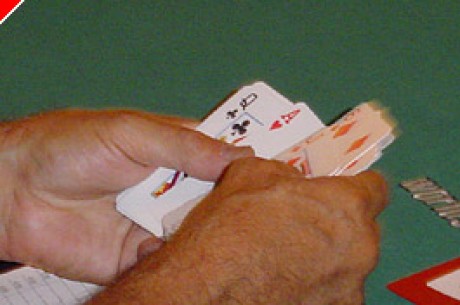Stud Poker Strategy – The 'Hit and Run'

There is a school of poker strategy that encourages the hit and run approach. Others eschew it as much on the felt as they do on the road. Should you, the thoughtful poker player, embrace or avoid such a strategy?
First of all, what is the hit and run in poker? I'll give you a quick example.
It was early Saturday morning. I arrived at Foxwoods at 6:30 AM. There were three empty seats at one table. I sat down. I bought in for $1,500. I folded my first three hands. On my fourth hand I was dealt (A♥ K♥) A♠. I raised to $20. Three other players called me. They appeared very weary. I bet the hand to the river. Three called me to fifth street, two called me to and on the river. My Aces became Aces up on sixth street and I won the pot. I folded the next hand. The hand after that I was rolled up with 9s. I bet it to the river and had four callers nearly all the way. I was up over $800 in about 15 minutes. I left before 7:00 AM and went home.
The hit and run, or hitting and running, is the quick departure from a game – especially after winning a large pot or a couple of large pots in a short period of time
Is this a good way of approaching the game or a bad approach?
Traditional poker theorists like David Sklansky and Mason Malmuth would not recommend this. They would note that if the game were good – were it a generally profitable one for you – then you should stay and continue to take advantage of it for as long as it stayed good. To enter a game with the intent of leaving after some predetermined time or after the winning of a previously established "win limit" amount would go against these teachings. Better, if you have won a lot quickly, to stay if the conditions are good. The good player would only leave quickly if he noticed that the game did not remain good – irrespective of whether or not he had quickly or slowly won some money. They would note that in the example game, where I left after 15 minutes of play, that I had made a large mistake – missing out on the opportunity to continue to win money in this loose passive game.
Others note that it's profitable to leave when you're ahead – rather than playing and getting ground down by the rake or just suffering the normal dips of good fortune that often happen over a period of time. If you can score quickly and big, they'd argue, then high tail it out of there before things turn around and you end up on the inevitable downswing of good fortune. No one wins forever, they'd note, so get while the getting is good. They'd opine that I did the right thing by leaving – since my run of cards was especially good and was bound to get worse. Leaving when I did saved me from hitting the downward slope of the roller coaster ride that always exists.
Both schools of thought have something to recommend them. The former is surely logical. If you are getting the best of it in a game, because you have an edge over the cumulative poker skills of your opponents, why limit the amount you could win in a session by leaving prematurely. Surely, if the winning of $800 in 15 minutes is an indication of your poker acumen, you could win many times that amount if you stayed in the same game, with the same conditions, for three or four hours. If the $800 is not an indication of your skill – if the game is bad – then you shouldn't be in it anyway. You should leave the game – but not because you've won – but rather because it's a bad game. Poker is one long session. Any particular "session" is just an artificial construct within the larger construct of a long game. Leaving early doesn't insure a "win" because the session just continues when you return to the poker table the next time. The profitable player must win as much as possible when in a good game precisely because conditions are not always good.
The latter school of thought that embraces a hit and run strategy also makes some sense. Once you are up and met your goal for a session, why put your success at risk? Results do fluctuate at the table. Luck does play a part in your results. Why tempt fate?
Both philosophies have flaws, however. The former approach – of staying as long as possible if the game is good – doesn't give enough credence to the possibility that you will not be able to objectively determine whether the game does remain good for you. Much like drivers who are drunk, they think that they are still good drivers – because they are drunk. Players, whose play has diminished, through weariness, boredom, or even anxiety because they have won a lot of money quickly, often fail to notice that they no longer have the best of it – because they aren't at their best. Without an artificial limit to their play, they will continue to drain away their winnings and eventually their entire bankroll, incorrectly inflating their own abilities and therefore their assessment of how good the game is.
But the hit and run supporters also err. They act as if poker is a roller coaster – with ups and downs that are predictable and foreseeable. Up for twenty minutes? Then you'll have to be ready to start going down. You've won $800? Then you're bound to lose some of it back? This is mystical, superstitious, alchemistic gibberish. Though luck is surely a factor in poker, luck is only something that can be understood in retrospect. There is no way to predict when you will get lucky or unlucky. As such, short-term results should not influence your decision of whether to stay or leave. Staying or leaving a game should be a product of whether or not the game conditions are profitable for you or not. Stay when they are; leave when they are not. If you are a good player and having a winning session, it's at least more likely than not that some of that win is attributable to your skill.
Here's my rule of thumb. I want to continue to play when I have the best of it – for as long as I continue to have the best of it. But, at the same time, I recognize my limitations. I am not a computer; nor are my opponents. My poker skills are influenced by my mental state. I am susceptible to fear, cowardice, carelessness, inattention, arrogance, and the like. I have found that when I am up a great deal – especially if it happens quickly – I become distracted, at least momentarily, by the awful thought that I might lose the money back and end up down, in spite of my quick success. This is surely a flaw in my game. I must cure it if I am to become my best. But until I do, I have to acknowledge that I don't play my best when I win quickly. Shame on me – but it's true. I must recognize the truth of my limitations and not pretend that I can play optimally. So I must do the next best thing. I must take myself away from the table when I think that my play may be influenced for the worse by my circumstances.
Sometimes, as in the example above, when I win a lot of money quickly I leave the table. I actually take my money off the table and cash out. Then I walk around and think about what I've done. If I can calm down and return to my normal, thoughtful, observant, calm poker-playing self, then I sign up for the game again and start all over. I do this not because of some superstition that I'll lose it all back because of the ebb and flow of luck, but because I've learned that I don't play my best game in these situations. It's something I need to work on if I want to optimize my play. But until I conquer this beast, I'm better off away from the table than playing.
Poker is surely a logical game. But our reaction to it may not always be so. From my experience, you should hit and run if when you hit you are unable to continue to play your best game – and if that suboptimal game threatens your ability to win. You are running away not from the vagaries of luck – which is a mirage – but from your own negative reaction to good fortune. And that is surely logical.








